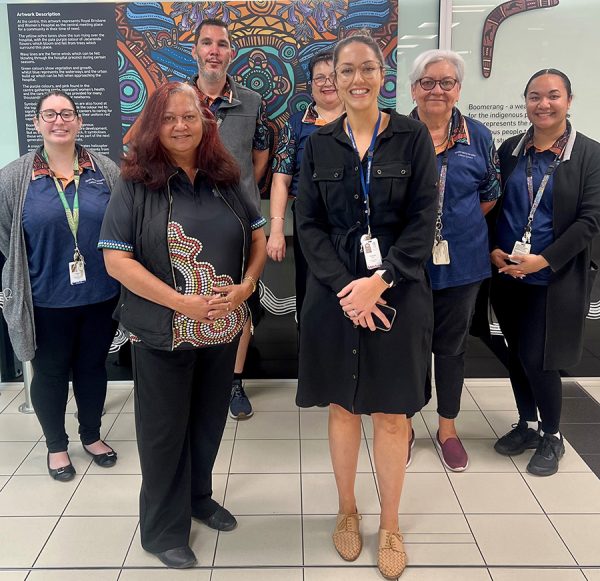Reducing Indigenous fail to attend rates
The Making Connections initiative at the Royal Brisbane and Women’s Hospital is helping improve access to outpatient appointments for Aboriginal and Torres Strait Islander patients.
The initiative was developed in response to an increased incidence of Aboriginal and Torres Strait Islander patients who were failing to attend scheduled outpatient appointments or were not responding to outpatient appointment offers. Prior to commencement of the project, a fail to attend rate of 9.6 per cent was identified among Aboriginal and Torres Strait Islander patients, compared to 5.1 per cent among non-Indigenous patients.
Making Conn ections is a collaboration between the Surgery and Perioperative Services Improving Outpatient Access Team, the Indigenous Health Liaison Officers (IHLOs) and most importantly, the patients.
ections is a collaboration between the Surgery and Perioperative Services Improving Outpatient Access Team, the Indigenous Health Liaison Officers (IHLOs) and most importantly, the patients.
The intention of the program is to provide Aboriginal and Torres Strait Islander patients with a culturally safe channel to manage their outpatient appointment at RBWH through facilitating the creation of an environment that empowers them. By providing Indigenous patients with initial contact with an IHLO prior to attending their first appointment, a sense of trust and comfort is cultivated with the healthcare service through cultural connectivity.
Throughout implementation multiple strategies were employed to improve outpatient appointment access, including rescheduling patient appointments to a mutually agreeable time, initiating waitlist transfers to services closer to home, converting face-to-face appointments to virtual care, aligning multiple hospital appointments to occur on the same day, co-ordinating initial consultations with same-day procedures to prevent patients from travelling to Brisbane on multiple occasions and organising inpatient consultations for admitted patients.
Through the program, the Making Connections team was able to support 418 Aboriginal and Torres Strait Islander patients to attend 494 surgical outpatient appointments.
RBWH Acting Clinical Nurse Consultant and Surgical Outpatients Coordinator Amanda Murphy said that while further analysis of the results is yet to be obtained, the project has been extremely rewarding.
“Developing and implementing the Making Connections initiative has highlighted the complex nature of not only our healthcare system and outpatient appointment management at RBWH, but also of this population group,” Ms Murphy said.
“We now have a greater understanding of the barriers to attending appointments for Aboriginal and Torres Strait Islander people, who have often travelled long distances to obtain outpatient care in hospital.
“This initiative is all about providing personalised patient-centred care, that ensures the patient is adequately supported through the healthcare system in a culturally safe manner.”
RBWH IHLO Emma Galea said that Aboriginal and Torres Strait Islander patients come to RBWH from all over Australia, including from rural and remote communities, which can be an extremely daunting experience for them.
“In addition, there is a generational history of negative experiences with governmental bodies, leading to many of our Aboriginal and Torres Strait Islander patients being reluctant to attend appointments,” Ms Galea said.
“Making Connections provides a culturally sensitive, patient-centred, respectful approach, and builds trust with the patient. The trust that our IHLO staff gain can then transfer to other RBWH staff which is reassuring for the patient.
“We have found that the relationship that is initially built with Making Connections leads to the patients contacting the IHLO Service for support in other, unrelated admissions and appointments.”
RBWH Acting Director Outpatients Kate Dickson said that the learnings generated from the Making Connections initiative are also helping inform and improve First Nations appointment attendance from a hospital-wide perspective.
“Thanks to the work of the Making Connections team, the wider outpatients team has since been inspired to look at how we can support Aboriginal and Torres Strait Islander patients with their appointments across the entire outpatient department to ensure they are provided with the same level of support throughout their care journey,” Ms Dickson said.
